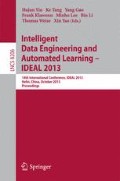Abstract
Due to the increasing amount of large data sets, efficient learning algorithms are necessary. Also the interpretation of the final model is desirable to draw efficient conclusions from the model results. Prototype based learning algorithms have been extended recently to proximity learners to analyze data given in non-standard data formats. The supervised methods of this type are of special interest but suffer from a large number of optimization parameters to model the prototypes. In this contribution we derive an efficient core set based preprocessing to restrict the number of model parameters to \(O(\frac{n}{\epsilon^2})\) with n as the number of prototypes. Accordingly, the number of model parameters gets independent of the size of the data sets but scales with the requested precision ε of the core sets. Experimental results show that our approach does not significantly degrade the performance while significantly reducing the memory complexity.
Access this chapter
Tax calculation will be finalised at checkout
Purchases are for personal use only
Preview
Unable to display preview. Download preview PDF.
References
Belle, V.V., Lisboa, P.J.G.: Research directions in interpretable machine learning models. In: Proc. of ESANN 2013 (2013)
Biehl, M., Hammer, B., Schneider, P., Villmann, T.: Metric learning for prototype-based classification. In: Bianchini, M., Maggini, M., Scarselli, F., Jain, L.C. (eds.) Innovations in Neural Information Paradigms and Applications. SCI, vol. 247, pp. 183–199. Springer, Heidelberg (2009)
Vapnik, V.: The nature of statistical learning theory. Statistics for engineering and information science. Springer (2000)
Chen, H., Tino, P., Yao, X.: Probabilistic classification vector machines. IEEE Transactions on Neural Networks 20(6), 901–914 (2009)
Schleif, F.M., Villmann, T., Hammer, B., Schneider, P.: Efficient kernelized prototype-based classification. Journal of Neural Systems 21(6), 443–457 (2011)
Gisbrecht, A., Mokbel, B., Schleif, F.M., Zhu, X., Hammer, B.: Linear time relational prototype based learning. Journal of Neural Systems (2012) (in press)
Badoiu, M., Har-Peled, S., Indyk, P.: Approximate clustering via core-sets. In: STOC, pp. 250–257 (2002)
Tsang, I.H., Kocsor, A., Kwok, J.Y.: Large-scale maximum margin discriminant analysis using core vector machines. IEEE TNN 19(4), 610–624 (2008)
Schneider, P., Biehl, M., Hammer, B.: Distance learning in discriminative vector quantization. Neural Computation 21(10), 2942–2969 (2009)
Biehl, M., Ghosh, A., Hammer, B.: Dynamics and generalization ability of lvq algorithms. Journal of Machine Learning Research 8, 323–360 (2007)
Hammer, B., Hasenfuss, A.: Topographic mapping of large dissimilarity data sets. Neural Computation 22(9), 2229–2284 (2010)
Seo, S., Obermayer, K.: Soft learning vector quantization. Neural Computation 15(7), 1589–1604 (2003)
Hammer, B., Hoffmann, D., Schleif, F.M.: Learning vector quantization for (dis-)similarities. NeuroComputing (in press, 2013)
Schleif, F.-M., Gisbrecht, A.: Data analysis of (Non-)Metric proximities at linear costs. In: Hancock, E., Pelillo, M. (eds.) SIMBAD 2013. LNCS, vol. 7953, pp. 59–74. Springer, Heidelberg (2013)
Tsang, I.W., Kwok, J.T., Cheung, P.M.: Core vector machines: Fast svm training on very large data sets. Journal of Machine Learning Research 6, 363–392 (2005)
Martinetz, T., Schulten, K.: Topology representing networks. Neural Networks 7(3), 507–522 (1994)
Chitta, R., Jin, R., Havens, T., Jain, A.: Approximate kernel k-means: Solution to large scale kernel clustering, pp. 895–903 (2011)
Har-Peled, S., Kushal, A.: Smaller coresets for k-median and k-means clustering. Discrete & Computational Geometry 37(1), 3–19 (2007)
Schleif, F.M., Zhu, X., Gisbrecht, A., Hammer, B.: Fast approximated relational and kernel clustering. In: Proceedings of ICPR 2012, pp. 1229–1232. IEEE (2012)
Tsang, I.W., Kocsor, A., Kwok, J.T.: Simpler core vector machines with enclosing balls. In: Proc. of ICML 2007, pp. 911–918 (2007)
Frénay, B., Verleysen, M.: Parameter-insensitive kernel in extreme learning for non-linear support vector regression. Neurocomputing 74(16), 2526–2531 (2011)
Mika, S., Rätsch, G., Weston, J., Schölkopf, B., Smola, A.J., Müller, K.R.: Invariant feature extraction and classification in kernel spaces. In: Solla, S.A., Leen, T.K., Müller, K.R. (eds.) NIPS, pp. 526–532. The MIT Press (1999)
Schneider, P., Geweniger, T., Schleif, F.M., Biehl, M., Villmann, T.: Multivariate class labeling in robust soft LVQ. In: Proceedings of ESANN 2011, pp. 17–22 (2011)
Author information
Authors and Affiliations
Editor information
Editors and Affiliations
Rights and permissions
Copyright information
© 2013 Springer-Verlag Berlin Heidelberg
About this paper
Cite this paper
Schleif, FM., Zhu, X., Hammer, B. (2013). Sparse Prototype Representation by Core Sets. In: Yin, H., et al. Intelligent Data Engineering and Automated Learning – IDEAL 2013. IDEAL 2013. Lecture Notes in Computer Science, vol 8206. Springer, Berlin, Heidelberg. https://doi.org/10.1007/978-3-642-41278-3_37
Download citation
DOI: https://doi.org/10.1007/978-3-642-41278-3_37
Publisher Name: Springer, Berlin, Heidelberg
Print ISBN: 978-3-642-41277-6
Online ISBN: 978-3-642-41278-3
eBook Packages: Computer ScienceComputer Science (R0)

